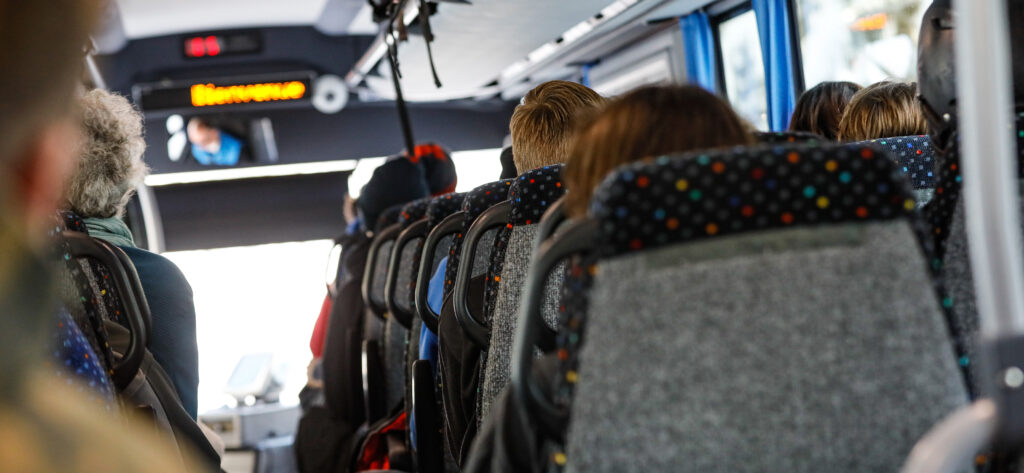Find out all the information you need to know before you travel !

Your ticket
All customers must be able to present a valid ticket to the staff in charge of checking or boarding on board. The ticket can be presented in printed form or in digital format from a smartphone or tablet.
Customers must present themselves at least 20 minutes before the departure of the coach.
Rules to follow when traveling
For your safety and that of all passengers, you must remain seated in your place and fasten your seatbelt for the entire duration of the journey.
Similarly, you are asked not to :
- Board with ski boots on
- Speak to the driver unnecessarily during the journey
- Smoke or vape inside the bus
- Eat or drink
- Consume alcohol
- Spit, throw waste, or any other object inside the vehicle or onto the public road from it
- Obstruct traffic within the vehicle or the boarding or disembarking of other passengers
Reserved Seats
The 4 seats located to the right and left behind the driver are primarily reserved for:
- War veterans, blind civilians, hearing-impaired individuals, and disabled workers, provided they hold a disability card
- Civilian disabled individuals
- Pregnant women
- Elderly people or those with reduced mobility
- People accompanied by children under 3 years old
Luggage transport
Please note! Coach luggage capacity is limited. It is therefore essential to comply with baggage size and weight restrictions. Hold baggage must not weigh more than 20 kg per person and its total dimensions must not exceed 150 cm, corresponding to the sum of the 3 dimensions: length + width + depth.
A ‘luggage pack’ is included in the price of each ticket. This pack includes 1 suitcase or travel bag (to be placed in the hold of the vehicle) + 1 set of boots + ski or snowboard (placed in the hold) + 1 piece of hand luggage to be placed in the luggage rack on board the coach.
Luggage must comply with the dimensions specified in the General Terms and Conditions of Sale. Hand luggage, to be kept on board the coach, remains under the care and full responsibility of the customer. It must not hinder traffic or safety on board the vehicle. Luggage must be labelled with the name, telephone number and address of the customer concerned. The customer is solely responsible for labelling the baggage. Luggage must be hermetically sealed. No object (such as a helmet, bag, etc.) may be attached to the outside of the baggage.
The following are prohibited on board and in the luggage compartments of Transaltitude coaches :
- Any object or material that is dangerous, illegal, dirty, flammable, corrosive, explosive or in gaseous form
- Glass containers, on board and in the hold (except in suitcases)
- Bicycles, folded or not, without exception
- Shopping bags, tote bags, crates, parcels, etc.
- Large ski roller bags.
Any excess baggage or baggage whose weight or volume exceeds the above conditions will be considered as oversized baggage and will not be accepted on board the coaches. However, at the time of boarding and subject to available space in the hold, this baggage may be taken on board for an additional charge of €90 per oversize bag.
Animal transport
Dogs on a leash, muzzled, and secured, as well as cats and other caged pets on the passenger’s lap, are allowed on board, provided they do not disturb other travelers and comply with the applicable pricing conditions for animals.
Category 1 attack dogs and exotic pets (such as snakes, spiders, etc.) are strictly prohibited on the bus.
Enforcement of this regulation and violations
Any passenger in an irregular situation (no ticket, invalid, out-of-date, damaged, falsified ticket, etc.) is liable to be issued with a ticket by a sworn official, for the amount of the fare in force. The amount and rules for the application of offences are applied in accordance with the Transport Code and the Code of Criminal Procedure.
The amount of flat-rate fines is set as follows:
- Absence of a valid ticket: €50
- falsified or fraudulent tickets: €70
- Other types of third-category violations: €70
- Fourth-category violation : €165
In cases of incivility, insults, threats, physical violence, theft, or aggression towards a passenger, the driver, a conductor, or the offending passenger will be issued a violation report and may face legal action.
Exceptional circumstances
VFD cannot be held responsible if the schedules of its services are not adhered to:
- In case of road traffic disruptions (weather phenomena, high passenger volume, traffic accidents, etc.)
- In case of uncontrollable force majeure (passenger medical emergencies, etc.)
- In case of necessary waiting or regulation to ensure connections with other partner transport modes (especially SNCF trains)
Given the potential for adverse weather conditions (snowfall, ice, etc.) or traffic conditions, Transaltitude strongly recommends that customers choose trips scheduled with sufficient margin (a minimum of 1 hour— 2-3 hours during school holidays or weekends) to adequately ensure their potential connections with other means of transport.


